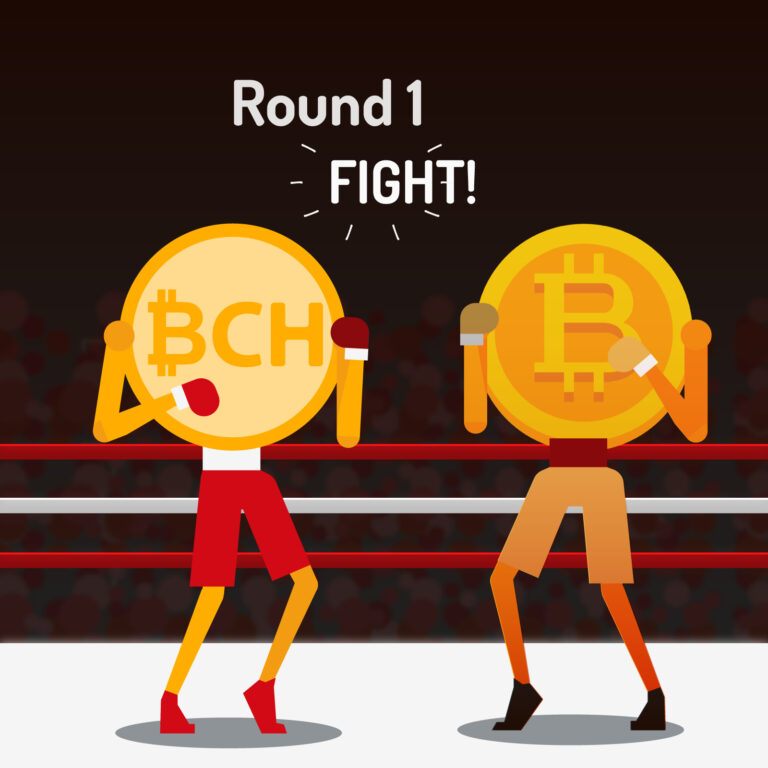If you’ve been in the crypto space for longer than 6 months, then you’re already accustomed to the entire scaling debate and the controversy regarding which version of the Bitcoin is the real one or Satoshi’s original vision.
The failure of the New York Agreement and the transaction fee crisis from the fall of 2017 have drawn many people towards the Bitcoin fork that Bitcoin.com CEO Roger Ver, Bitmain founder Jihan Wu, and self-proclaimed Bitcoin inventor Craig S. Wright fervently support.
To anyone who observes the events without an ideological or financial bias, it’s clear that there is an original Bitcoin that everyone knows and recognizes on financial markets as BTC (or, on some exchanges, XBT), and then there’s a fork which rightfully deserves the “altcoin” label for being established 9 years later and not being compatible with transactions from the original Bitcoin blockchain (Bitcoin Cash, also known as BCH). But supporters of each camp possess their own weapons to actually turn the Bitcoin brand into a juvenile battlefield of trolling and name-calling.
If you believe in scaling via block size increase, then you’re a supporter of “Bcash”, an individual who accepts Bitmain’s monopoly on mining and tolerates a greater amount of centralization, and a sockpuppet of Roger Ver.
If you support the original Bitcoin, you’re a “Blockstream fanboy”, an advocate of high transaction fees, and a SegWit/Lightning Network traitor who went too far from Satoshi’s original vision. If you’re like Andreas Antonopoulos and try to find the middle ground between the sides by pointing out the pros and the cons, you’re bound to be accused of being some kind of mercenary who switches views according to the source of the paycheck.
This entire “if you’re not with us, then you must be against us” mentality has to go and leave room for more rational debates. Otherwise, we’re shooting ourselves in the foot before being able to become competitive on the financial markets… and allegedly children die because of the slow Bitcoin adoption.
BCH is the BTC I’ve been using since 2011
— Roger Ver (@rogerkver) April 21, 2018
Without further ado, let’s point out the flaws of each camp and settle this battle once and for all. It’s not like the arguments will cease and the Reddit sections will become less divided and tribal because of one analysis, but it’s good to try to understand the other side. Believing in the coin inside your bag is a big part of being a cryptocurrency supporter, but let’s move past graphs and stats.
The Flaws Of Bitcoin
Throughout the past year, Bitcoin (BTC, just to be clear) has lost dominance on the market. Lots of altcoins have emerged and claimed to replace the good old invention of Satoshi Nakamoto by improving some aspects of its protocol, and as the adoption rate grew and more money started to pour into the cryptocurrency market, our faithful BTC started to show its scalability issues.
The stubbornness of a majoritarian faction and the fear of being overtaken by institutional interests has kept the block size at 1 MB, just to be sure that the miners and nodes didn’t require expensive hardware upgrades which would prohibit participation. Since fees are calculated according to the Satoshis per byte ratio and the network had become pretty clogged in the second half of 2017, we’ve witnessed an unpleasant phenomenon which made transactions ridiculously expensive.
The scaling options proposed and consented by the community are SegWit (Segregated Witness) and the Lightning Network, with Schorr signatures soon following to optimize the way data gets stored into blocks. While these are solid options which seem to show their advantages on the long term, an entire faction within the community had become disillusioned with the upgrades and cited whitepaper conservatism as the reason behind their disillusionment.
People like Roger Ver have said that “This no longer is the Bitcoin that we first discovered and we’d rather take the hardware scaling route than change the protocol”. This is how Bitcoin Cash was born.
Sure, maybe that SegWit and the Lightning Network were rushed onto the main network and might still be in an experimental phase. But if you’re a fan of the old ways and want to conduct transactions the way Satoshi intended you to, then you’re free to use the traditional methods. This is part of the beauty of Bitcoin: it allows you to choose your preferred way to make transfers or payments and is expected to grow as the engineering develops. There’s a reason why we still don’t have easily-accessible LN solutions for the public, as programmers still establish nodes and expand the network before opening it to large audiences.
This comes at the cost of allowing altcoins to grow, but every market has the same kind of situation – when Apple launches the new iPhone, they temporarily one-up Samsung and Google until their new releases and the cycle goes on. This is part of the beauty of free markets and it only marks growth and development.
Is Blockstream too influential? Yes, but it doesn’t have the kind of political power Roger Ver has and the decisions within the Bitcoin community are made in a more democratic way. They reach consensus slower because they require intensive debates and a mutually-convenient middle ground. While Bitcoin Cash might move towards a certain direction a lot quicker due to the more authoritative decision-making, Bitcoin always takes a wise and conservative decision which satisfies the criteria of utilitarianism (pleasing the largest number).
Before we move on to list all the flaws of Bitcoin Cash, it’s worth mentioning that there is a high degree of toxic tribalism in both camps, as the original Bitcoin fans use the Bcash label as much as they can and consequently determine the other side to respond in more aggressive ways that further blue the narrative line and confuse newcomers.

The Flaws Of Bitcoin Cash
Oh boy, where do we begin? First of all, it’s worth mentioning that the idea for this article began from a Reddit post which showed that the Bitcoin Block Explorer feature from Bitcoin.com lists BCH as “Bitcoin” and BTC as “Bitcoin Core”.
This is quite a big deal, as the plot thickens and Roger Ver’s channels push the kind of propaganda that seems to be taken from the KGB’s manual. They’re trying to rewrite history and make use of the Bitcoin.com domain name, the r/btc Reddit section, and the @Bitcoin Twitter dash to create a sense of ambiguation between the two coins.
The entire scenario is very much like the propaganda you’d read from the Ministry of Truth in George Orwell’s “Nineteen Eighty-Four”: repetition creates intellectual consent, history must be rewritten after every minor change according to the will of those in power, and words change their meaning for the sake of imposing an agenda. At any cost, despite being a fork and an altcoin, Bitcoin Cash must become Bitcoin, while Bitcoin gets called Bitcoin Core.
It’s their way of saying “we follow the Whitepaper literally, so we’re entitled to use the name despite not being technically right”. But at the same time, Bitcoin Cash is not as decentralized as the original Bitcoin and perpetually grows in centralization as the block size increases (perhaps Bitmain makes big profits from this way of conducting business), doesn’t have the same network of institutional partnerships, and Wall Street probably won’t touch the coin to offer futures or hold reserves of it.
Due to the alleged centralization, it has more accelerated pump cycles which translate in proportional price corrections, and the phenomenon has been observed plenty of times throughout the months.
Dear @reddit, I heard that as of recently you were not a profitable company.
I'll pay you $100,000 USD if you simply appoint a moderator to /r/Bitcoin who supports free speech. https://t.co/pFWK21QE6q
CC: @alexisohanian @wtfspez @brian_armstrong https://t.co/KTV8Rptk37— Roger Ver (@rogerkver) April 18, 2018
Then there’s the entire CSW story, as the masterminds behind Bitcoin Cash have thought about adopting their own messianic figure. Important members of the cryptocurrency space such as Etehreum’s Vitalik Buterin and Litecoin’s Charlie Lee strongly resent Craig S. Wright and his demonstrated lack of expertise in many technical fields.
If he makes mistakes when describing basic principles of the Bitcoin protocol, then how can anyone believe that he is Satoshi Nakamoto? Well, in spite of the sketchy evidence, people who aren’t quite software engineers or blockchain experts seem to be more open and take the agnostic approach to the Faketoshi situation. He does have university degrees to certify his knowledge, so he must know what he’s talking about, right? Yet using a false prophet and history-rewriting techniques cannot be justified by the fact that you’re employing the original vision. And the truth is that such tactics wouldn’t be necessary if the product truly was superior.
If Bitcoin Cash really was the better coin which possessed the potential to bank the unbanked and bring the power of the blockchain to the world, then attacks to the more progressive and forward-thinking BTC wouldn’t be necessary. Mentioning that the Lightning Network is experimental would be redundant if scaling through increasing block sizes really worked as promised, and there would be no point to dismiss SegWit. The truth is that all these attacks are a sign of weakness and smart investors won’t fall for the hype.
I wonder what BTC miners will do when BCH takes over and they are left holding digital beanie babies nobody will buy…
Such short term thought in some…
Oh well… why I love capitalism
— Dr Craig S Wright (@ProfFaustus) April 18, 2018
In order to look more credible, Bitcoin Cash needs to grow organically towards becoming more decentralized and actually reducing the correlation between Roger Ver’s tweets and the pumps. They should focus their discourse on looking competitive and building a brand of their own, rather than trying to appropriate something that was left without a patent for a clear and selfless reason. Bitcoin Cash is Bitcoin just like the Soviet Union was the application of doctrinary communism.
It’s a revolution which started from above and has very loose foundations outside the centralized ownership of capital and means of communication. It doesn’t have a history of people using their laptops to mine coins just for fun, as it jumped straight to the ASICs. And the community lacks that grassroots spirit of voluntaryism that you can find on Bitcointalk or other forums which existed since the early days, as those involved in Bitcoin Cash are first and foremost incentivized by a paycheck.
While the words of the 16th century poet John Lyly might be true and all is fair in love and war, this in-between state should channel more reason and a wiser approach. While the original Bitcoin (which seems to be made to sound old and obsolete with the Bitcoin Core label, despite being subjected to the more progressive scaling methods) has a long history of successes and milestones, those who want to dethrone it must prove their superiority in technical terms. All altcoins have their pros and cons, but none of them will ever get to be called Bitcoin.








